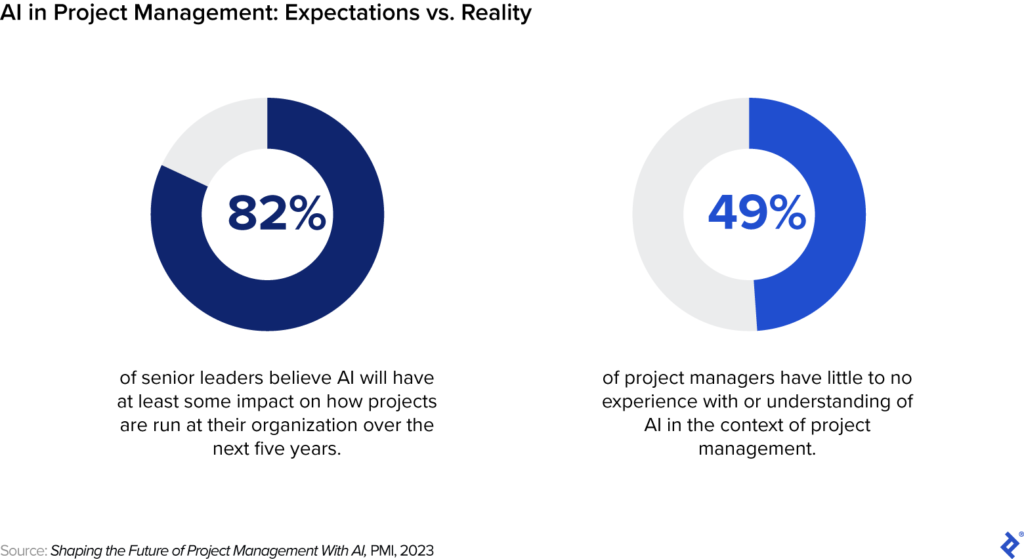Using AI in Project Management: Key Applications and Benefits

Unlocking Project Success with AI: A Comprehensive Guide
Realizing enhanced project outcomes involves tapping into the vast potential of AI. However, navigating the multitude of tools available and understanding their effective application can be challenging. This guide provides comprehensive insights into what you need to know for harnessing the power of AI in your projects.
The Rise of Artificial Intelligence in Project Management
Artificial intelligence (AI) is spearheading a transformative era of heightened efficiency and efficacy in project management. According to a 2023 survey by the Project Management Institute (PMI), project managers within organizations fully embracing AI are 30% more likely to achieve timely project delivery and 23% more likely to meet or surpass ROI estimates.
Recent PMI research reveals that 82% of senior leaders anticipate AI having some impact on the execution of projects within their organizations over the next five years. However, a significant gap persists, as 49% of project managers admit to having limited to no experience or understanding of AI in the context of project management.
Addressing this disparity is imperative. Transitioning from a managing partner role at a small software company to a data leadership position at an organization 20 times its size, I have consistently prioritized enhancing project delivery and outcomes. In both capacities, the integration of AI tools has proven to be the primary driver of success. AI’s capacity to analyze intricate data sets, optimize resource allocation, anticipate potential risks, and automate routine tasks not only elevates project execution but also fosters an agile mindset within organizations—allowing continuous adaptation to the ever-evolving technological landscape.

Exploring AI’s Impact on Project Management: Applications, Benefits, and Challenges
Artificial Intelligence (AI) is revolutionizing project management, ushering in an era of unparalleled efficiency and effectiveness. According to a 2023 survey by the Project Management Institute (PMI), organizations fully embracing AI are experiencing a 30% higher likelihood of on-time project delivery and a 23% increased chance of meeting or exceeding Return on Investment (ROI) estimates.
Despite these promising statistics, a significant gap exists, with 49% of project managers admitting limited experience or understanding of AI within the realm of project management. Bridging this knowledge gap is crucial, as AI tools play a pivotal role in enhancing project delivery and outcomes.
AI and Project Management: Current Applications and Benefits
AI-driven project management tools offer diverse applications, contributing to more successful project outcomes in the following areas:
- Data Analysis and Predictive Analytics
AI’s rapid data processing capabilities empower project managers to make evidence-based decisions with unprecedented precision. By analyzing historical project data, AI identifies patterns and predicts potential risks, offering valuable insights for risk mitigation. The ability to transcend language barriers ensures comprehensive risk logs, minimizing delays and budget overruns. AI is evolving to automate the generation of performance metrics and predictive reports, providing real-time project insights. Platforms like Asana, Jira, and Azure are already incorporating AI, offering project managers the ability to adapt swiftly. - Risk Management
AI assists project managers in risk management by analyzing network traffic patterns to detect anomalies indicating potential cybersecurity threats. In software development, AI-driven code analysis tools identify code quality issues early, allowing effective resource allocation and defect reduction. Tools like Jira track velocity trends, enabling project managers to focus on remediation and enhance issue resolution. - Communication and Collaboration
Virtual assistants have emerged as a significant advancement, handling common queries, scheduling meetings, and providing updates. Integrated into communication software like Slack or Microsoft Teams, virtual assistants ensure timely information dissemination.
Note-taking tools such as Otter.ai and Rev Online Voice Recorder simplify capturing spoken information, enhancing accessibility and shareability. Translation tools break down language barriers, facilitating global collaboration in IT projects.
Sentiment analysis tools gauge stakeholder engagement and satisfaction, providing valuable insights for communication strategy adaptation. Tools like MonkeyLearn offer sentiment analysis for enhanced project management. AI in Project Management: Challenges and Potential Solutions. While optimism surrounds AI’s potential in project management, challenges must be addressed:
Data Availability and Quality
AI relies on reliable data points for training, and inaccurate or biased data can lead to flawed predictions. Organizations need to invest in ensuring data accuracy, adherence to quality standards, and suitable formats for algorithm interpretation. Starting with communication or administrative tasks allows for a gradual introduction to AI, followed by functions requiring larger, quality datasets.
Scaled Implementation
Achieving scaled impact with AI tools requires trialling, documenting, implementing, and widespread adoption of processes. The learning curve associated with new technologies can impede acceptance, necessitating effective training sessions for individuals and groups.
Tool Limitations
AI lacks judgment and intuition, critical elements in complex decision-making and stakeholder management. Project managers should view AI tools as supportive aids, recognizing their limitations and preserving the human element’s thought and innovation.
In conclusion, AI’s integration into project management promises transformative benefits, but understanding its applications, addressing challenges, and adopting a supportive approach are essential for successful implementation.
